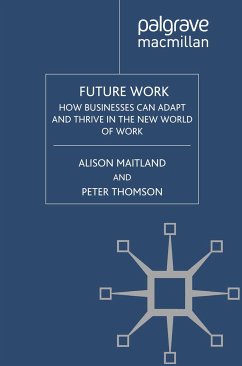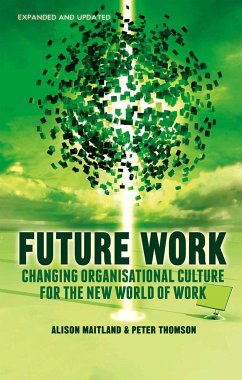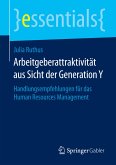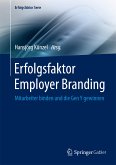Dieser Download kann aus rechtlichen Gründen nur mit Rechnungsadresse in A, B, BG, CY, CZ, D, DK, EW, E, FIN, F, GR, HR, H, IRL, I, LT, L, LR, M, NL, PL, P, R, S, SLO, SK ausgeliefert werden.
"This book provides challenging and persuasive examples of the need to change and is recommended as a wake-up call to the corporate world." - Management Today
'Future Work sounds seductive. But very few organizations have actually changed the way they really do work. Maitland and Thomson have painted a comprehensive and compelling picture of what's possible, going way beyond the typical hype about technology and GenY. And they've dug deeply to report many very human stories about how the future of
work is happening today, and what it takes to transform the workplace. If you read this book and then put it aside without changing the way you manage, you'll wind up watching the future of work from the sidelines.' James P. Ware, Executive Director, The Future of Work unlimited
'An invaluable resource for anyone who needs to increase employee productivity and reduce costs, and wants to do so in a way which is economically, environmentally and socially sustainable.' Stephen Leonard, Chief Executive, IBM UK and Ireland
'Future Work lives up to its title it presents a compelling view of how work is being transformed in ways that benefit the employee and employer alike. More than that, it is a compelling call to action that shows us how to create much more flexible and effective workplaces.' Ellen Galinsky, President, Families and Work Institute, and author of Mind in the Making
'Alison Maitland and Peter Thomson have assembled an illuminating body of evidence in this robust and readable analysis of work transformation that deserves to become a classic in its field. Using case studies drawn from progressive employers, they spell out why this change is happening and how it can be achieved. Future Work is an essential tool for future management.' Richard Donkin, author of The Future of Work
'Future Work lays out a compelling business case for flexibility that offers essential guidance for leaders grappling with a changing workforce, globalization and continuous advances in technology. The authors challenge conventional attitudes with a powerful
rationale on how work can be accomplished with more precision and efficiency, while simultaneously reducing costs and offering employees more control over how they work.' Michel Landel, CEO, Sodexo
'Future Work is an excellent guide with plenty of examples to inspire 21st-century managers to become real '2.0 leaders'. It will help them develop their skills to introduce flexibility in an uncertain and changing global environment in which individuals are selfmotivated and want to integrate their professional and personal lives. It is empowerment in practice!' Nuria Chinchilla, Professor of Managing People in Organizations, IESE Business School
'The 19th century had an agrarian workforce, and the 20th century an industrial one. Now in the 21st century we have an information workforce, and as a result everything must change again. Maitland and Thomson provide invaluable insights into what future work will look like, and what organizations must do now to adapt to the imperatives of the mobile, global, knowledge economy.' Murray D. Martin, Chairman, President & CEO, Pitney Bowes Inc.









